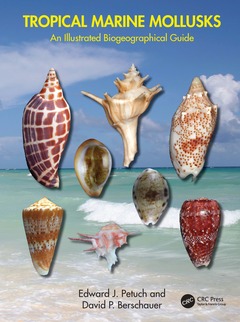Tropical Marine Mollusks An Illustrated Biogeographical Guide
Auteurs : Petuch Edward J., Berschauer David P.

Marine biogeography, the study of the spatial distribution of organisms in the world?s oceans, is one of the most fascinating branches of oceanography. This book continues the pioneering research into the distributions of molluscan faunas, first studied by biologists over 160 years ago. It illustrates 1778 species of gastropods in full color, many of which are extremely rare and poorly known endemic species that are illustrated for the first time outside of their original descriptions.
The spatial arrangements of malacofaunas shown in this book can be considered proxies for worldwide oceanic conditions and used as tools for determining patterns of global climate change. The book's documentation of evolutionary "hot spots" and geographically restricted endemic faunas can also be used as a base line for future studies on patterns of environmental deterioration and extinction in the marine biosphere.
Documenting the evolution of the amazingly rich worldwide gastropod fauna, this book will appeal to physical and chemical oceanographers, systematic and evolutionary biologists, historical geologists, paleontologists, climatologists, geomorphologists, and physical geographers. The authors incorporate aspects of all of these disciplines into a new classification system for the nomenclature of biogeographical spatial units found in tropical, subtropical, and warm temperate seas.
Introduction. Acknowledgments. Foreword. Chapter1. Biogeographical Patterns in the Marine Biosphere. Chapter 2. Western Atlantic Region. Chapter 3. Eastern Atlantic Region. Chapter 4. Eastern Pacific Region. Chapter 5. Indo-Pacific Super-Region and Central Pacific Region. Chapter 6. Western Pacific Tropical Region. Chapter 7. Indian Tropical Region. Chapter 8. Australian Super-Region and North Tropical Australian Region. Chapter 9. South Australian Paratropical Region. Chapter 10. Southern Africa Region. Bibliography. Systematic Index. Biogeographical Index.
Edward J. Petuch was born in Bethesda, Maryland in 1949. Raised in a Navy family, he spent many of his childhood years collecting living and fossil shells in such varied localities as Chesapeake Bay, California, Puerto Rico, and Wisconsin. His early interests in malacology and oceanography eventually led to BA and MS degrees in zoology from the University of Wisconsin-Milwaukee. During his MS thesis research, Petuch concentrated on the molluscan biogeography of West Africa, traveling extensively in the Canary Islands, Western Sahara, Senegal, Gambia, Sierra Leone, Ivory Coast, and Cameroons. During this time, he also conducted research on the molluscan ecology of both coasts of Mexico and the Great Barrier Reef of Belize. Continuing his education, Petuch studied marine biogeography and malacology under Gilbert Voss and Donald Moore at the Rosenstiel School of Marine and Atmospheric Sciences at the University of Miami, where he received a full scholarship. During this time, his doctoral dissertation research involved intensive field work in Costa Rica, Colombia, Venezuela, Barbados, the Grenadines, and Brazil, where he often went to sea with the local shrimpers for weeks at a time. After receiving his Ph.D. in oceanography in 1980, Petuch was invited to conduct two years of postdoctoral research, funded by the National Science Foundation, with Geerat Vermeij at the University of Maryland. While there, he also held a research associateship with the Department of Paleobiology at the National Museum of Natural History, Smithsonian Institution, under the sponsorship of Thomas Waller, and conducted field work in the Plio-Pleistocene fossil beds of Florida and North Carolina and the Miocene fossil beds of Maryland and Virginia. Petuch has also collected and studied living mollusks in Australia, Papua-New Guinea, Fijis, French Polynesia, Japan, the Bahamas, Nicaragua, and Uruguay. This research has led to the publication of over 300 scientific papers an
Date de parution : 12-2020
21x28 cm
Thèmes de Tropical Marine Mollusks :
Mots-clés :
Sowerby II; Gastropods species; Molluscan Province; Marine biogeography; Molluscan Faunas; Molluscan faunas distributions; Cone Shell; Organisms spatial distribution; Endemic Gastropods; Oceanography; Species Radiations; Louisiade Archipelago; Turtle Grass Beds; Endemic Species; Endemic Taxa; Low Tide; Bohol Island; Tamil Nadu; Coffee Bay; Western Sahara; Panamic Province; Solomon Islands; Cape Verde Islands; Espirito Santo State; Great Barrier Reef; Carolinian Province; Norfolk Ridge; Caribbean Province; Cape Verdes; Great Australian Bight



